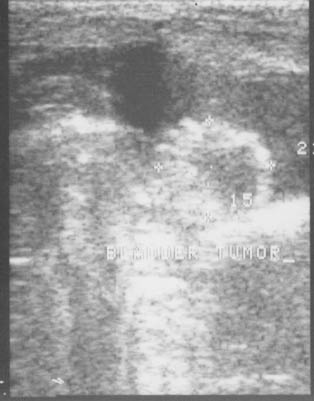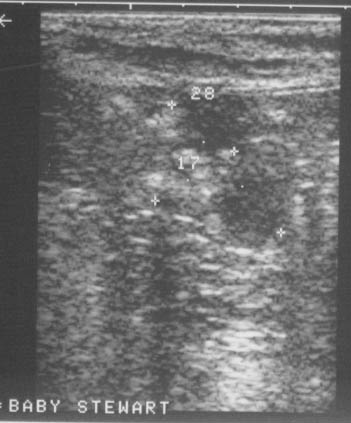

I noticed my 14 year old bitch squatting frequently and that her urine looked dark. Upon a collection of urine, the urine looked orange colored, like weak tea color. The urinalysis showed many transitional cells, with abnormal cancer type appearance. The initial diagnosis was Transitional Cell Carcinoma. Ultrasound examination showed a large tumor located at the base or neck of the bladder. Beagles have risk factor 4 times the normal dog for this type cancer.
At this time "Baby" was eating and acting normal. My vet recommended starting Piroxicam therapy. Piroxicam is the drug "Feldene" and was initially used as a arthritis drug in humans. The dosage for a dog has to be calculated per weight and my vet had the prescription for my beagle "compounded" (or specially made at a compounding pharmacy). It was about 12.00 per month for treatment. The drug can upset the stomach so I had to give it to her with the evening feeding. It is given once a day everyday.Baby's tumor was found in August 2003. In March 2004 a repeat Ultrasound was done and dramatic reduction of tumor size was noted. (see pictures) 2003 is the first one-see the round object. 2004 is second picture.


Baby lived until January 2005. I had 16 extra months with her due to drug treatment. She was comfortable and eating well until the last few weeks. I noticed a change in the color of her urine and her appetite started decreasing. I cooked special goodies for her and feed her as much as she would eat. Chicken, cat food, beef and tuna was her favorite. Her final day started with her totally refusing food. She still went outside and was carrying her favorite toy. During the afternoon she started to look depressed and she vomited a couple of times. She stopped carrying her toy and was staying in her crate. The look in her eyes told me she was starting to hurt and I had to say good bye. Making the decision to euthanize a beloved pet is difficult, but it is the last thing we can do for them, not let them suffer. This page is for Baby...
Transitional Cell Carcinoma (TCC) is the most common malignancy of the urinary tract in dogs. Although the actual incidence is low, there has been a 250% increase in cases over the past 10 years. TCC has a poor prognosis because it is usually diagnosed when the disease is quite advanced and therapy is less successful. Most cases occur in dogs more than 7 years old. Females and overweight dogs appear to be at higher risk. Usually there is a high malignancy rate at time of diagnosis.
Diagnosis is complicated by clinical signs which mimic urinary tract infections. Such signs and symptoms include:
Hematuria - Brown color or blood in the urine
Pollakiuria - Frequent urinations, usually
in small amounts
Dysuria - Difficult or painful urination
Poor response to antibiotics
For detailed information about TCC (diagnosis, treatment and prognosis) please visit Purdue University's pages and information on current studies.
For an in-depth first hand account of dealing with a dog with bladder cancer, additional links, and more technical information visit this link. Rennie's Story